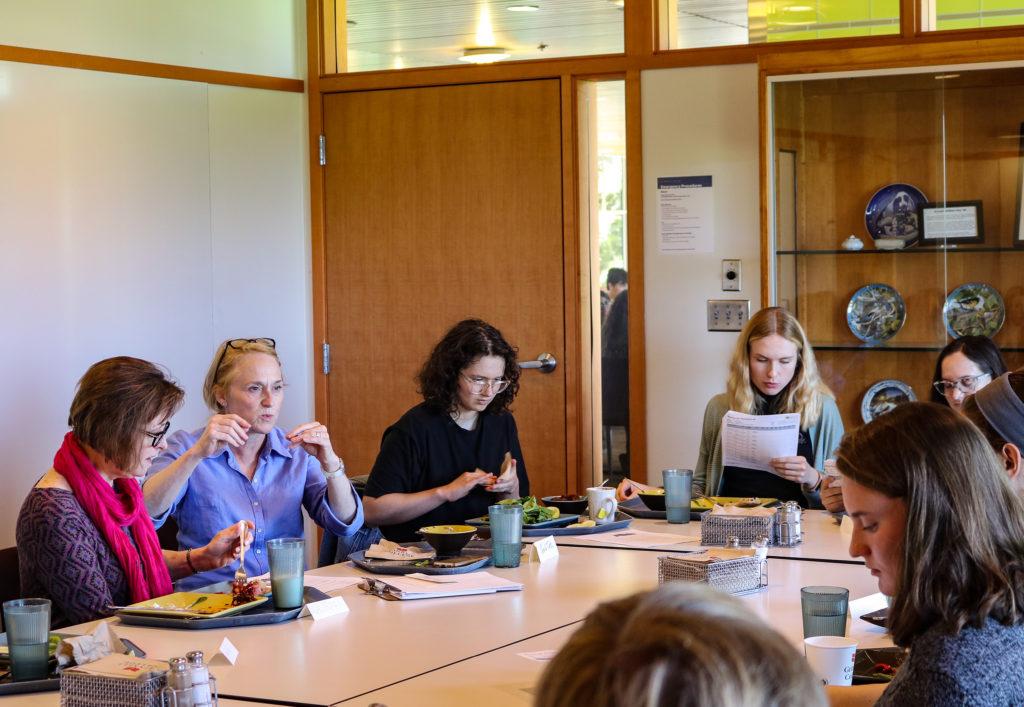Every Wednesday at 12 p.m., students and faculty gather over lunch in JRC 224-A to discuss the political climate in the state and the country at the Iowa Caucus Table, led by Professor Barb Trish, political science.
These discussions, Trish says, are meant to be modeled after language tables, where students can practice speaking conversationally with professors from a language department. “We sort of liked the idea of informal discussions, and then with the caucus that made so much sense, to organize something around the caucuses.”
This time, a wide range of topics were discussed by the students and faculty in attendance. Trish began the discussion by asking, “What do you think the average Iowan, perhaps without any caucus affiliation, is experiencing during this time?”
Trish encouraged students to “think outside of the politically engaged bubble” that Grinnell provides. Several wondered whether most Iowans were annoyed by the constant campaigning, or whether they even noticed it. “I have no doubt that a lot of people can tune it out,” Trish said.
As the discussion continued, Trish led the conversation to candidate’s television advertisements that plaster the local Iowa networks, distributing a hand-out detailing Elizabeth Warren’s reserved advertisement space for Jan. 6 to 12, 2020. “Why would she book it that far out?’ one student asked.
Students continued to ask questions, and the conversation shifted toward campaigns’ use of personal data. “Is that even legal?” a student asked regarding repeated calling, emailing and texting. Several students expressed frustration with this bombardment of their space, including on social media.
As that conversation wound down, Trish asked everyone to share about political events they had attended over the last week. One student talked about Pete Buttigieg’s town hall at a Newton elementary school on Saturday. Another student talked about the Iowa Steak Fry, which 17 Democratic candidates attended, in Des Moines on Saturday.
Professor Trish encouraged students to stay aware of upcoming campaign events for various candidates and to attend “even if you don’t know if you support that candidate” because they can be a “great way to observe politics.” She recounted an event for Republican challenger Mark Sanford that she attended in Coralville, where she felt she learned a lot.
The discussion then shifted to outline the Republican primary process and why several states have declined to hold primary elections at all.
As the hour was wrapping up, another faculty member posed the question of how impeachment proceedings might impact the caucus. Several students were skeptical it would affect the mentality of the general public.
“I think there’s been talking of impeachment pretty much since he’s been elected to office. What’s going to be different this time?” one student asked. “It injects a lot of uncertainty,” Trish concluded, leaving students and faculty to further ponder the question.
Daniel Snyder ’22, said that this was not his first time attending.
“Last time, there was a guest speaker who talked about her blog about the Iowa caucuses,” he said. This time, according to him, was “a much more broad discussion.” He reported that he will attend in the future because he enjoys the conversation.
At the Iowa Caucus Table next week, Professor Gemma Sala, political science, and Professor Xavier Escandell, anthropology, will lead a discussion on Brexit.
























































